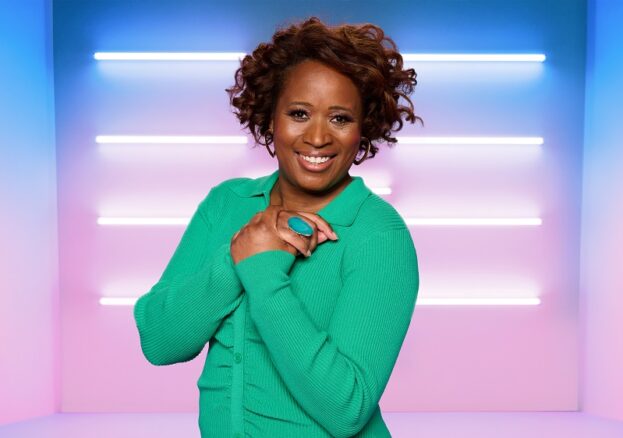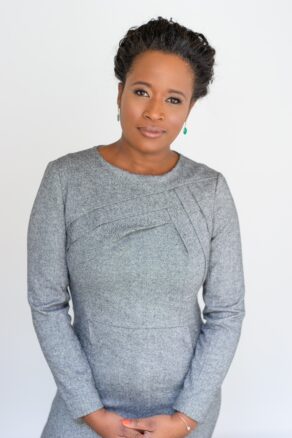
Charlene White is a British television broadcaster, journalist and presenter. As a news anchor and broadcaster for ITV news and Loose Women, Charlene is one of the most recognisable faces on TV. Black History Month met with Charlene to talk about forging a path and leaving a legacy.
Do you get used to being a celebrity?
No! I think when you’re raised a certain way, it’s hard to see yourself as a celebrity. I still find it surprising when people recognise me because I don’t walk into a room expecting it.
What advice do you give to other black women trying to get into news or broadcasting?
 It’s not easy but for anyone wanting to get into the industry, there is a lot of jumping through hoops and seven day weeks! I would also say don’t let other people define who you should be! If I didn’t live with this mantra, I wouldn’t be doing what I’m doing. Whenever I came across barriers, or walked into environments that were trying to steer me in other directions, I would focus on with my path. For example there weren’t many people who thought you could present News at 10 and present Loose Women at the same time. I refused to listen to those who said it would signal the end of my news career. There’s absolutely no reason why someone can’t do both. That was a path I knew that I could go down and simply did not allow myself to be dictated by what someone says I should be. I push boundaries. I wear my hair natural and refuse to be beholden to what others deem to be professional! I’m blessed to be in the position where I can make decisions about what I choose to do, and I know the impact that it will have elsewhere so that’s a position that I don’t take lightly. This industry is hard, but I hope its slightly easier for the generation that comes after me.
It’s not easy but for anyone wanting to get into the industry, there is a lot of jumping through hoops and seven day weeks! I would also say don’t let other people define who you should be! If I didn’t live with this mantra, I wouldn’t be doing what I’m doing. Whenever I came across barriers, or walked into environments that were trying to steer me in other directions, I would focus on with my path. For example there weren’t many people who thought you could present News at 10 and present Loose Women at the same time. I refused to listen to those who said it would signal the end of my news career. There’s absolutely no reason why someone can’t do both. That was a path I knew that I could go down and simply did not allow myself to be dictated by what someone says I should be. I push boundaries. I wear my hair natural and refuse to be beholden to what others deem to be professional! I’m blessed to be in the position where I can make decisions about what I choose to do, and I know the impact that it will have elsewhere so that’s a position that I don’t take lightly. This industry is hard, but I hope its slightly easier for the generation that comes after me.
What do you think of the theme ‘Saluting Our Sisters’?
I think it’s brilliant because it encapsulates what we do – we hold each other up and celebrate each other! That’s incredibly important because people like to think, ‘if you’re women at work then you must surely be battling against each other, fighting your way to the top.’ And it’s not that at all; there are very few of us comparatively, that are doing this sort of work. We’ve all worked hard to get to where we are, so all we want to do is celebrate each other’s success and achievements.
Do you think we could do more though as women to support each other?
I’d like to think we are supporting each other in various ways. Be that looking at someone’s CV or connecting them to someone. There have been moments in my life and career where I’ve been moaning about something and it was my sisters that gave me the most salient advice, which I carried through and it led to good things. We are all busy with our work but if one of us needs something, we are there for one another.
Who do you want to salute?
Those women who I have grown up calling auntie (my mum’s friends). I see how hard they have worked through the decades – especially in lifting their children up, putting them on a better, stronger path. I have no idea what it’s like to move here to a culture that actively didn’t want you there. When they’re not getting promotions simply because they are a woman and they’re not getting the health care they deserve simply because they’re black women. Having the strength to carry on when every avenue in which we’re trying to work is actively working against you, is something I admire because that’s a strength that I don’t think anyone in my generation will ever truly know.
What’s a phrase that your mum used to say?
“Show me your friends and I’ll show you who you are”
Because of this, I’ve been very mindful about the friends I have. I have a strong squad around me. Your squad can lift you up and give you strength. You don’t always have to go it alone. When we need each other, the sisters assemble and carry each other through.
What do you want people to remember about you?
That I didn’t pull up the ladder behind me. I would hate for somebody to think that I made these changes in broadcasting but forgot I was black. I will never forget that. I am comfortable in my blackness and I want people to live in a society where they don’t have to be less of themselves in a professional environment simply because of the colour of their skin. I would like to think that my legacy is that I came and I represented.
